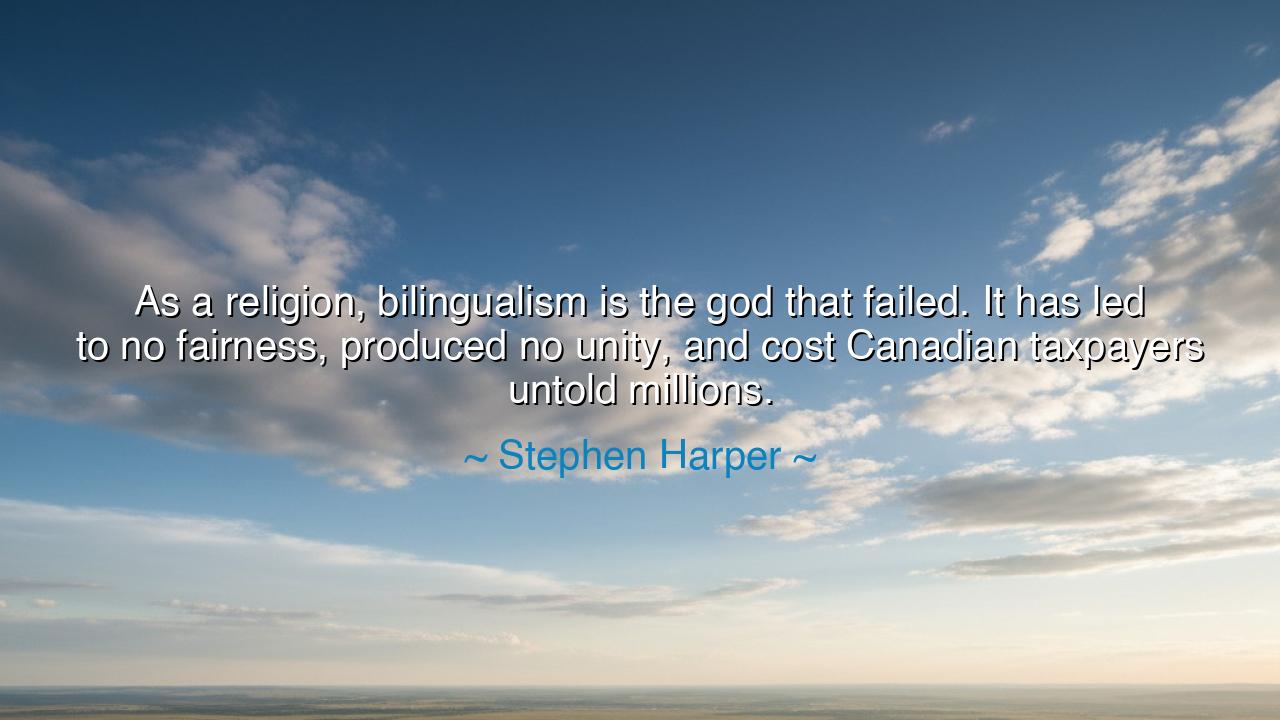
As a religion, bilingualism is the god that failed. It has led to
As a religion, bilingualism is the god that failed. It has led to no fairness, produced no unity, and cost Canadian taxpayers untold millions.






Hear now, O seekers of wisdom, the words of Stephen Harper, who boldly declared, "As a religion, bilingualism is the god that failed. It has led to no fairness, produced no unity, and cost Canadian taxpayers untold millions." These words resonate with the weight of truth and frustration, for they call attention to a great experiment in societal engineering—the idea that by imposing bilingualism, a country can create harmony among its people. Harper’s statement is a challenge to the very foundation of this idea, questioning whether the ideal of bilingualism has truly brought the unity and fairness it was meant to foster.
In ancient times, the concept of unity was sacred, held in the highest regard by kings and philosophers alike. The Roman Empire, for example, stretched its power across vast lands, uniting a diverse array of people under one banner. However, the strength of that unity was not based on linguistic equality, but on the integration of different peoples into a system where their individual identities were preserved, while law and order were upheld. The Romans understood that true unity came from common values, shared goals, and mutual respect, not from forcing people into uniformity in language. Likewise, Harper’s words invite us to reflect on whether imposing bilingualism in Canada, as a policy or even as a sacred ideal, has truly served the unity and progress of the nation, or if it has instead fractured it further, creating division where harmony was intended.
The idea of bilingualism in Canada was founded on good intentions—an attempt to balance the rights of the French-speaking and English-speaking populations, to honor both languages as integral to Canadian identity. Yet, as Harper contends, what began as a measure for fairness has, over time, become a burden, a symbol of a lofty but failed ideal. For decades, taxpayers have shouldered the cost of bilingual services, translations, and policies that, in many cases, have done little to bridge the gap between these two linguistic communities. Rather than creating a harmonious blend, bilingualism has sometimes led to a splitting of allegiances, a sense of division rather than unity. The ideal of equal respect for both languages has, for many, turned into a political and economic reality that no longer serves the best interests of all.
Consider the rise of the French-Canadian nationalist movement in the 1960s, particularly in Quebec, where the quiet revolution marked a time of heightened tensions around the issue of language and culture. The desire for autonomy, for the recognition of French as the dominant cultural force within Quebec, was a call for fairness—yet, in its most extreme forms, it sowed division, not just between French and English, but also among Canadians themselves. The imposition of bilingual policies, rather than uniting the country, seemed to accentuate the difference between people, causing a divide that continues to echo through Canadian politics today. Harper’s words, then, can be seen as a critique of a system that, in his view, has failed to create the unity it promised.
Bilingualism, in many ways, reflects the ancient struggle between individual identity and the collective good. The tension between preserving the unique identity of a group and integrating it into a larger society has been a constant theme throughout history. The Greeks, for example, with their city-states like Athens, prized the diversity of their polis but understood the importance of shared values and civic responsibility for true unity. Canada, in its pursuit of fairness, may have sacrificed some of these core principles of shared community in favor of a concept that seeks to treat language as the defining marker of belonging. Harper’s critique invites us to reconsider whether it is language that truly unites, or whether it is shared values, goals, and the spirit of cooperation that are the true foundation of any thriving society.
Thus, O seekers, the lesson here is one of balance. The ideal of bilingualism may have been born from the noble intent to create a more inclusive society, yet the cost of pursuing this ideal through policy has led to division, not harmony. In your own lives, remember that true unity is not found in the imposition of one ideal over another, but in the shared pursuit of common good. We must not let our differences—whether of language, culture, or belief—define us in opposition, but instead seek the unity that arises from shared purpose, mutual respect, and the willingness to embrace the complexities of life together.
So, take these teachings to heart. Recognize that no single policy or ideal will ever serve the whole, if it fails to honor the deeper unity of the human spirit. Seek out the common ground where all can stand together, not in the shadows of division, but in the light of shared understanding. True fairness and unity come not from uniformity, but from the ability to respect and nurture diversity, to celebrate the strength in our differences and the purpose that binds us all.






AAdministratorAdministrator
Welcome, honored guests. Please leave a comment, we will respond soon